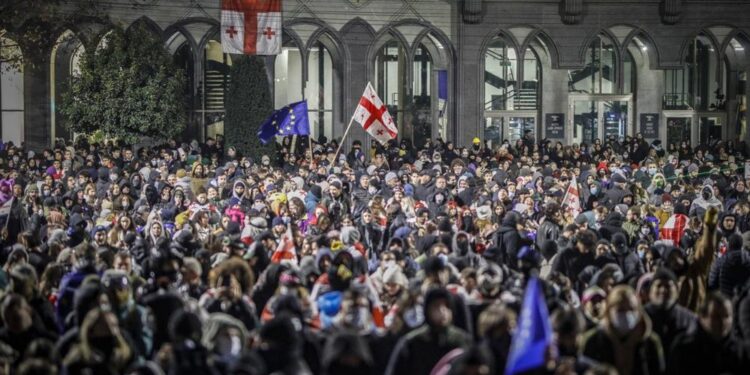Georgia’s Unrest: EU Urges Accountability and Sanctions
The recent turmoil in Georgia has ignited widespread protests, prompting the European Union’s representative to stress the importance of defining specific criteria for sanctions against those responsible for violence and civil unrest. As citizens rally against controversial legislation viewed as governmental overreach, the EU’s call for accountability highlights a significant conflict between state power and individual liberties. With tensions escalating, international observers are closely monitoring developments that could influence Georgia’s ties with Europe and its democratic framework.
Criteria for Sanctions in Response to Georgian Unrest
The ongoing protests in Georgia have raised concerns among global stakeholders. The EU envoy has indicated that there is significant justification for imposing sanctions on particular individuals involved in human rights violations during this period of unrest.Triggered by proposed laws perceived as threats to personal freedoms, these demonstrations reflect a deep-seated public dissatisfaction. In response to rising tensions, the EU is contemplating targeted measures aimed at holding accountable those who stifle dissenting voices and jeopardize democratic institutions.
Potential sanctions may encompass various actions directed at key figures associated with the unrest, including:
- Focused Actions Against Officials: Targeting individuals linked to acts of violence or repression.
- Support for Civil Society: Allocating resources to organizations advocating human rights.
- Diplomatic Engagements: Continuous dialogues with Georgian authorities aimed at promoting reform.
| Type of Sanction | Plausible Outcomes |
|---|---|
| Bans on Travel | Deny entry into EU member states for implicated officials. |
| Freezing Assets | Affect financial operations of targeted individuals. |
| Banning Financial Transactions | Lessen access to global banking systems. |
EU Envoy Advocates Targeted Measures Against Rights Violations
The recent surge in protests has drawn considerable attention from representatives within the European Union who advocate focused measures addressing escalating violations of civil liberties. Following extensive demonstrations met with reported crackdowns by authorities, there is an urgent need highlighted by the envoy—an approach prioritizing accountability while upholding human rights principles is crucial amidst rising tensions. The call for sanctions serves not only as a reactive measure but also as a strategic response reinforcing commitments toward democratic values.
The envoy outlined several considerations regarding potential actions against violators during these tumultuous times:
- Identifying Key Offenders: Concentrating efforts on those responsible for human rights abuses amid protests.
- Evaluating Impact: Assessing possible economic repercussions resulting from proposed sanctions on ordinary citizens.
- Encouraging Dialog: Facilitating discussions between government representatives and civil society groups aimed at reconciliation.
| Consideration | Details |
|---|---|
| Targeted Measures | Concentrate on specific actors while minimizing unintended consequences. |
| Public Safety | Ensure measures do not escalate violence or disorder. |
| Long-term Solutions | Promote reforms leading towards sustainable peace.Strategies For Upholding Democratic Values Amid ProtestsThe evolving situation in Georgia necessitates a extensive framework designed to strengthen democratic principles amidst ongoing civil disturbances.It is essential that open channels of interaction be established among all parties involved—including government officials, opposition leaders, and civic organizations—to ease tensions while ensuring diverse perspectives are acknowledged within decision-making processes. Key strategies include:
|
















